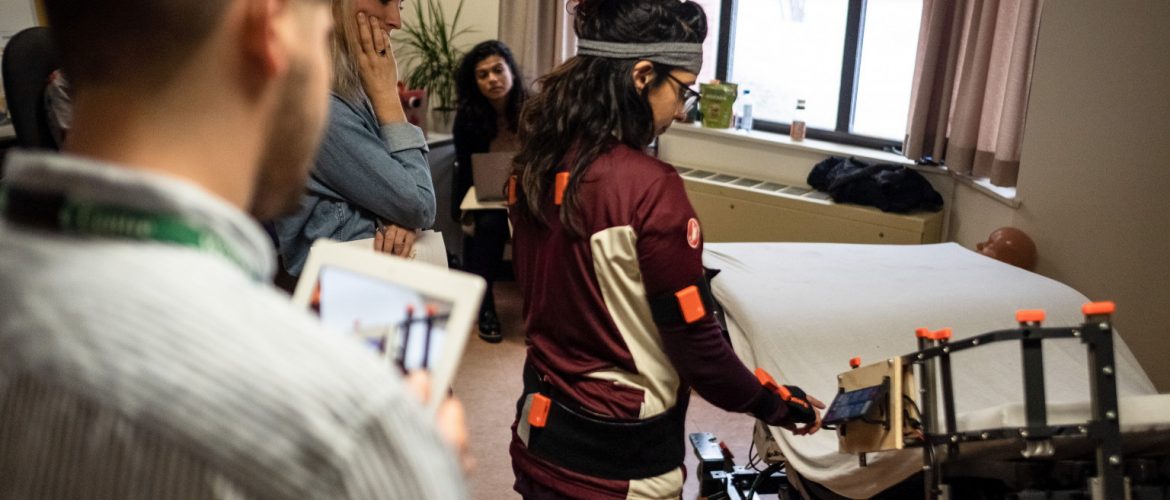We are in the middle of a healthtech renaissance. As the shockwaves of COVID-19 reverberate throughout our world, older adults, caregivers and front-line care professionals are turning to technology for things like social engagement, virtual doctor visits, and remote check-ins now more than ever before.
Yet, many Canadian healthtech startups, with a focus on improving the lives of older adults, are facing “an early-stage funding gap,” says James Mayer, Senior Manager, Investments & Venture Services at the Centre for Aging + Brain Health Innovation (CABHI), preventing their solutions from getting to those who need it the most.
CABHI hopes to close this funding gap through its MC2 Market Readiness initiative, part of the ongoing Mentorship, Capital, and Continuation (MC2) program, in partnership with National Bank. Applications for MC2 Market Readiness are open now, but closing soon – on Monday, September 7.

Applications are open for the MC2 Market Readiness Program until September 7.
MC2 Market Readiness will connect select companies (virtually) to Silicon Valley through world-class accelerator, Berkeley SkyDeck’s Global Innovation Partnership (GIP) program, giving them the resources to grow and scale competitively at home and abroad.
“We know how challenging it can be for global startups to come to Silicon Valley,” says GIP program manager, Jun Jiang. “That’s why we have this program. It creates a soft-landing place for companies and reflects our mission to be the global hub for entrepreneurship.”
As SkyDeck’s Executive Director Caroline Winnett points out, Silicon Valley continues to be an El Dorado for startups looking to access the US and global markets.
“It is still the place with the highest concentration of startup professionals, investors, advisors and founders. There’s nothing like it anywhere.”
Being able to connect with Canadian companies has also been a valuable component of the program for SkyDeck. “We love our CABHI companies,” says Winnett. “They are talented, hardworking and a real delight to work with.”
Successful companies in MC2 Market Readiness will also receive an investment of up to $150,000CAD from CABHI. The investment offers safer terms and can help companies achieve a specific business milestone to unlock Seed or Series A funding.
That was certainly the experience of MindfulGarden, creators of a behaviour modification platform that de-escalates anxiety in people living with dementia. They participated in a pilot version of MC2 Market Readiness and called it a “game changer.” As co-founder Mark Ross shares, “We were able to leverage the credibility and vast network of UC Berkeley to connect with key investors, media, health authorities, and others in the US healthcare system.” Matthew Sefati, Co-founder & COO, Curiato, whose medtech company also participated in the pilot program, adds that Curiato “successfully met new growth investors in Silicon Valley and potential clients across the US.”

Catherine Winckler
Former participants also site mentorship as a highlight of the program. “The level of workshops, mentorship, and access to capital was extraordinary,” says Catherine Winckler, Co-founder, MindfulGarden. She adds that “As a female founder, the opportunity to intersect with other female founders has been a unique experience.”
SkyDeck’s Spring cohort amplified these views, recently sharing how fantastic the experience of attending a virtual accelerator was in this Tech Crunch article.
While the GIP program is open to startups in all sectors, SkyDeck joins CABHI in recognizing the unique need for funding and resources in the aging and brain health sector.
“Over the next few years, there’s going to be a ton of development in technology associated with our brains,” says Winnett. “The sector is poised for the birth of some really great companies.”
With the launch of MC² Market Readiness, CABHI is at the forefront, ensuring that many of these great companies hail from Canada and are equipped to scale internationally. By fostering the growth and development of tech-based solutions, we can directly shape the broader digital revolution in healthcare, actively improve the lives of older adults, one of the pandemic’s hardest hit groups, and bridge the gap in funding facing Canadian startups.


